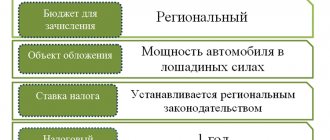Unlike land and property taxes, transport tax is regional, that is, it is established in the constituent entities of the Russian Federation and goes to their budget. In our publication today we will look at who pays this tax, the procedure for paying it and by what formula it is calculated.
Payers of transport tax are persons on whom vehicles equipped with an engine are registered. Namely: cars, buses, scooters, motorcycles, helicopters, motor ships, airplanes, yachts, sailing ships, boats, motor sleighs, motor boats, jet skis and snowmobiles.
Formula and examples for calculating transport tax
The Tax Service calculates transport tax in 2015 using the following formula:
Tax Amount = Tax Rate X Horsepower X (Number of Months Owned / 12 Months)
The formation of tax rates for transport tax occurs in accordance with Art. 361 of the Tax Code of the Russian Federation. It says, in particular, the following:
Tax rates are established by the laws of the constituent entities of the Russian Federation depending on engine power, jet engine thrust or gross tonnage of the vehicle per horsepower of engine power.
Tax rates for transport tax in each constituent entity of the Russian Federation may differ.
As a rule, in technical documents engine power is indicated in horsepower (hp). If instead of l. With. kilowatts (kW) will be indicated, they need to be converted to liters. s.: 1 kW = 1.35962 l. With.
Calculation of transport tax for a full calendar year
Sidorov P.A. registered a BMW X4 passenger car in the city of Krasnodar. The engine power of this car is 250 hp.
Calculation of transport tax in 2015
The tax rate for such a car in Krasnodar in 2015 is 75 rubles.
Transport tax = 18,750 rubles (75 rubles X 250 hp)
Transport tax rates in Moscow for 2015
Rates >>
Benefits >>
Payment deadlines >>
Rates
| Type of vehicle | Tax rate for organizations, rub. | Tax rate for citizens, rub. | Base |
| Passenger cars with an engine power (per horsepower) of up to 100 hp. With. (up to 73.55 kW) inclusive | 12 | 12 | Art. 2 of the Law of Moscow dated July 9, 2008 No. 33 |
| Passenger cars with engine power (per horsepower) exceeding 100 hp. With. up to 125 l. With. (over 73.55 kW to 91.94 kW) inclusive | 25 | 25 | |
| Passenger cars with engine power (per horsepower) exceeding 125 hp. With. up to 150 l. With. (over 91.94 kW to 110.33 kW) inclusive | 35 | 35 | |
| Passenger cars with an engine power (per horsepower) of over 150 hp. With. up to 175 l. With. (over 110.33 kW to 128.7 kW) inclusive | 45 | 45 | |
| Passenger cars with engine power (per horsepower) exceeding 175 hp. With. up to 200 l. With. (over 128.7 kW to 147.1 kW) inclusive | 50 | 50 | |
| Passenger cars with an engine power (per horsepower) of over 200 hp. With. up to 225 l. With. (over 147.1 kW to 165.5 kW) inclusive | 65 | 65 | |
| Passenger cars with engine power (per horsepower) exceeding 225 hp. With. up to 250 l. With. (over 165.5 kW to 183.9 kW) inclusive | 75 | 75 | |
| Passenger cars with an engine power (per horsepower) exceeding 250 hp. With. (over 183.9 kW) | 150 | 150 | |
| Motorcycles and scooters with engine power (each horsepower) of up to 20 hp. With. (up to 14.7 kW) inclusive | 7 | 7 | |
| Motorcycles and scooters with engine power (each horsepower) exceeding 20 hp. With. up to 35 l. With. (over 14.7 kW to 25.74 kW) inclusive | 15 | 15 | |
| Motorcycles and scooters with engine power (each horsepower) exceeding 35 hp. With. (over 25.74 kW) | 50 | 50 | |
| Buses with engine power (per horsepower) up to 110 hp. With. (up to 80.9 kW) inclusive | 15 | 15 | |
| Buses with engine power (per horsepower) over 110 hp. With. up to 200 l. With. (over 80.9 kW to 147.1 kW) inclusive | 26 | 26 | |
| Buses with an engine power (per horsepower) of over 200 hp. With. (over 147.1 kW) | 55 | 55 | |
| Trucks with an engine power (per horsepower) of up to 100 hp. With. (up to 73.55 kW) inclusive | 15 | 15 | |
| Trucks with engine power (per horsepower) exceeding 100 hp. With. up to 150 l. With. (over 73.55 kW to 110.33 kW) inclusive | 26 | 26 | |
| Trucks with engine power (per horsepower) exceeding 150 hp. With. up to 200 l. With. (over 110.33 kW to 147.1 kW) inclusive | 38 | 38 | |
| Trucks with engine power (per horsepower) exceeding 200 hp. With. up to 250 l. With. (over 147.1 kW to 183.9 kW) inclusive | 55 | 55 | |
| Trucks with engine power (per horsepower) exceeding 250 hp. With. (over 183.9 kW) | 70 | 70 | |
| Other self-propelled vehicles, pneumatic and tracked machines and mechanisms (per horsepower) | 25 | 25 | |
| Snowmobiles, motor sleighs with engine power (each horsepower) of up to 50 hp. With. (up to 36.77 kW) inclusive | 25 | 25 | |
| Snowmobiles, motor sleighs with an engine power (each horsepower) of over 50 hp. With. (over 36.77 kW) | 50 | 50 | |
| Boats, motor boats and other water vehicles with an engine power (per horsepower) of up to 100 hp. With. (up to 73.55 kW) inclusive | 100 | 100 | |
| Boats, motor boats and other water vehicles with an engine power (per horsepower) of over 100 hp. With. (over 73.55 kW) | 200 | 200 | |
| Yachts and other sailing-motor vessels with an engine power (per horsepower) of up to 100 hp. With. (up to 73.55 kW) inclusive | 200 | 200 | |
| Yachts and other sailing-motor vessels with an engine power (per horsepower) of over 100 hp. With. (over 73.55 kW) | 400 | 400 | |
| Jet skis with engine power (each horsepower) up to 100 hp. With. (up to 73.55 kW) inclusive | 250 | 250 | |
| Jet skis with an engine power (per horsepower) of over 100 hp. With. (over 73.55 kW) | 500 | 500 | |
| Non-self-propelled (towed) ships for which gross tonnage is determined (from each registered ton of gross tonnage) | 200 | 200 | |
| Airplanes, helicopters and other aircraft with engines (per horsepower) | 250 | 250 | |
| Airplanes with jet engines (per kilogram of thrust) | 200 | 200 | |
| Other water and air vehicles without engines (per vehicle unit) | 2000 | 2000 |
Benefits valid in the region
| Category of beneficiaries | Basis for the benefit | Size | Conditions for providing benefits | Basis from regional law |
| Organizations providing services for the transportation of passengers by public urban passenger transport | Provisions of the constituent documents defining passenger transportation as the main type of activity, the purpose of creating the organization, the availability of a valid license for passenger transportation | 100% | The benefit applies to vehicles transporting passengers in public urban passenger transport (except taxis) | Subp. 1 clause 1 art. 4 of the Moscow Law of July 9, 2008 No. 33 |
| Residents of the special economic zone of technology-innovation type "Zelenograd" | Extract from the register of residents of the special economic zone, issued by the management body of the special economic zone | 100% | The benefit applies to vehicles registered to residents from the moment they are included in the register of residents of the special economic zone, for a period of five years starting from the month of registration of the vehicle. The benefit does not apply to water, air vehicles, snowmobiles and motor sleighs | Subp. 2 p. 1 art. 4 of the Moscow Law of July 9, 2008 No. 33 |
| Heroes of the Soviet Union, Heroes of the Russian Federation, citizens awarded the Order of Glory of three degrees | Application, book of Hero of the Soviet Union, Hero of the Russian Federation or order book | 100% | The benefit is provided for one vehicle with an engine power of up to 200 hp. With. inclusive. The benefit does not apply to water, air vehicles, snowmobiles and motor sleighs | Subp. 3 p. 1 art. 4 of the Moscow Law of July 9, 2008 No. 33 |
| Veterans and disabled people of the Great Patriotic War | Application, standard certificate | 100% | The benefit is provided for one vehicle with an engine power of up to 200 hp. With. inclusive. The benefit does not apply to water, air vehicles, snowmobiles and motor sleighs | Subp. 4 paragraphs 1 art. 4 of the Moscow Law of July 9, 2008 No. 33 |
| Veterans and disabled combatants | Application, certificate or certificate of entitlement to benefits of the established form | 100% | The benefit is provided for one vehicle with an engine power of up to 200 hp. With. inclusive. The benefit does not apply to water, air vehicles, snowmobiles and motor sleighs | Subp. 5 p. 1 art. 4 of the Moscow Law of July 9, 2008 No. 33 |
| Disabled people of groups I and II | Application, certificate from a medical institution of the established form, confirming the fact that disability group I or II has been established | 100% | The benefit is provided for one vehicle with an engine power of up to 200 hp. With. inclusive. The benefit does not apply to water, air vehicles, snowmobiles and motor sleighs | Subp. 6 clause 1 art. 4 of the Moscow Law of July 9, 2008 No. 33 |
| Former minor prisoners of concentration camps, ghettos, and other places of forced detention created by the Nazis and their allies during the Second World War | Application, certificate of entitlement to benefits of the established form | 100% | The benefit is provided for one vehicle with an engine power of up to 200 hp. With. inclusive. The benefit does not apply to water, air vehicles, snowmobiles and motor sleighs | Subp. 7 clause 1 art. 4 of the Moscow Law of July 9, 2008 No. 33 |
| One of the parents (adoptive parents), guardian, trustee of a disabled child | Application, passport of a Russian citizen issued in the name of the taxpayer, birth certificate of the child specified in the application, copy of the act (extract from the act) of the guardianship and trusteeship authorities on the establishment of guardianship (trusteeship) over the child, a certificate of the established form confirming the fact that this child has been assigned a category disability "disabled child", information about the second parent (adoptive parent), guardian, trustee (full name and address of residence) | 100% | The benefit is provided for one vehicle with an engine power of up to 200 hp. With. inclusive and only to one of the parents (adoptive parents) of a disabled child. The benefit does not apply to water, air vehicles, snowmobiles and motor sleighs | Subp. 8 clause 1 art. 4 of the Moscow Law of July 9, 2008 No. 33 |
| Citizens who own passenger cars with an engine power of up to 70 hp. With. (up to 51.49 kW) inclusive | Application, copy of vehicle passport | 100% | The benefit is provided for one vehicle with an engine power of up to 200 hp. With. inclusive. The benefit does not apply to water, air vehicles, snowmobiles and motor sleighs | Subp. 9 clause 1 art. 4 of the Moscow Law of July 9, 2008 No. 33 |
| One of the parents (adoptive parents) in a large family | Application, certificate of a large family in Moscow, information about the second parent (adoptive parent) (full name and address of residence) | 100% | The benefit is provided for one vehicle with an engine power of up to 200 hp. With. inclusive and only to one of the parents (adoptive parents). The benefit does not apply to water, air vehicles, snowmobiles and motor sleighs | Subp. 10 p. 1 art. 4 of the Moscow Law of July 9, 2008 No. 33 |
| Citizens exposed to radiation as a result of the Chernobyl nuclear power plant disaster, the 1957 accident at the Mayak production association, the discharge of radioactive waste into the Techa River and nuclear tests at the Semipalatinsk test site | Application, standard certificate | 100% | The benefit is provided for one vehicle with an engine power of up to 200 hp. With. inclusive. The benefit does not apply to water, air vehicles, snowmobiles and motor sleighs | Subp. 11 clause 1 art. 4 of the Moscow Law of July 9, 2008 No. 33 |
| Citizens who, as part of special risk units, took direct part in testing nuclear and thermonuclear weapons, eliminating accidents of nuclear installations at weapons and military facilities | Application, standard certificate | 100% | The benefit is provided for one vehicle with an engine power of up to 200 hp. With. inclusive. The benefit does not apply to water, air vehicles, snowmobiles and motor sleighs | Subp. 12 clause 1 art. 4 of the Moscow Law of July 9, 2008 No. 33 |
| Citizens who received or suffered radiation sickness or became disabled as a result of tests, exercises and other work related to any types of nuclear installations, including nuclear weapons and space technology | Application, standard certificate | 100% | The benefit is provided for one vehicle with an engine power of up to 200 hp. With. inclusive. The benefit does not apply to water, air vehicles, snowmobiles and motor sleighs | Subp. 13 clause 1 art. 4 of the Moscow Law of July 9, 2008 No. 33 |
| Rowing boats, as well as motor boats with an engine power not exceeding 5 hp. With. | Information from registration authorities | 100% | Subp. 1 item 2 art. 358 Tax Code of the Russian Federation | |
| Passenger cars specially equipped for use by disabled people | Documents confirming that the vehicle has been converted for use by disabled people | 100% | Subp. 2 p. 2 art. 358 Tax Code of the Russian Federation | |
| Passenger cars with engine power up to 100 hp. With. (up to 73.55 kW) | Documents confirming receipt (purchase) of a car through social security authorities | 100% | Received (acquired) through social protection authorities in the manner prescribed by law | Subp. 2 p. 2 art. 358 Tax Code of the Russian Federation |
| Fishing sea and river vessels | Documents confirming the use of vessels in fishing activities | 100% | Subp. 3 p. 2 art. 358 Tax Code of the Russian Federation | |
| Passenger and cargo sea, river and aircraft owned (by the right of economic management or operational management) of organizations and individual entrepreneurs | – Provisions of the constituent documents (memorandum of association, charter, regulations and other documents) defining passenger and (or) freight transportation as the main type of activity, the purpose of creating the organization; – availability of a valid license for cargo and (or) passenger transportation; – receipt of revenue from passenger and freight transportation; – systematic implementation of passenger and (or) cargo transportation during navigation (for water vehicles); – availability of reporting established by law (including statistical) on completed transportation of passengers and (or) cargo | 100% | The main activity of which is passenger and (or) cargo transportation | Subp. 4 p. 2 tbsp. 358 Tax Code of the Russian Federation |
| Tractors, self-propelled combines of all brands, special vehicles (milk tankers, livestock trucks, special vehicles for transporting poultry, machines for transporting and applying mineral fertilizers, veterinary care, technical maintenance) | Documents confirming the status of an agricultural producer, and calculation of the cost of produced products, highlighting the produced agricultural products | 100% | Registered for agricultural producers and used in agricultural work for the production of agricultural products | Subp. 5 p. 2 art. 358 Tax Code of the Russian Federation |
| Vehicles owned by federal executive authorities with the right of operational control | Regulations on the relevant executive authorities where military or equivalent service is provided in accordance with Russian legislation | 100% | Legislatively provided military and (or) equivalent service | Subp. 6 paragraph 2 art. 358 Tax Code of the Russian Federation |
| Wanted vehicles | Document confirming the fact of theft of the vehicle | 100% | Subject to confirmation of the fact of their theft (theft) by a document issued by an authorized body | Subp. 7 paragraph 2 art. 358 Tax Code of the Russian Federation |
| Air ambulance and medical service planes and helicopters | Aircraft intended for medical and sanitary service must be marked with an image of a red cross or red crescent in accordance with GOST 18715-74 | 100% | Subp. 8 paragraph 2 art. 358 Tax Code of the Russian Federation | |
| Vessels registered in the Russian International Register of Ships | Certificate of the right to sail under the State Flag of the Russian Federation | 100% | Subp. 9 paragraph 2 art. 358 Tax Code of the Russian Federation |
Payment deadlines
| For organizations | For citizens |
| No later than February 5, 2021 (clause 1 of article 3 of the Moscow Law of July 9, 2008 No. 33) | No later than October 1, 2021 (paragraph 2, paragraph 1, article 363 of the Tax Code of the Russian Federation) |
Tax notice
After calculating the transport tax, the Federal Tax Service sends a tax notice to your place of residence. It contains information regarding the amount of tax and the deadline for its payment.
In 2015, residents of the Russian Federation will receive notifications from April to September. More detailed information about this can be found in the specific tax authority.
Please note that if erroneous data is discovered, you should write an application to the tax service and send it there along with a notification.
After the data has been confirmed, the tax amount is recalculated. The taxpayer receives a new notification from the Federal Tax Service, indicating a different amount to be paid.
Please note that transport tax in 2015 must be paid in any case, regardless of whether a notification was received from the Federal Tax Service or not.
On January 1, 2015, a law came into force, according to which taxpayers who have not received notifications from the tax authority are obliged to independently inform the Federal Tax Service about the availability of real estate and vehicles.
Thus, a message about the availability of a vehicle must be submitted to the Federal Tax Service no later than December 31 once. That is, if you purchased a car in 2015, then you must report this to the Federal Tax Service by December 31, 2021.
You can make an appointment for a personal appointment with the Federal Tax Service using the online service on the website.
Who pays transport tax
Transport tax is paid by companies and entrepreneurs with registered vehicles.
Difficulties in determining the taxpayer may arise if a vehicle registered in the name of an individual is transferred to another person on the basis of a power of attorney. In this case, two situations may arise:
- if the power of attorney was issued before July 30, 2002 (the date of official publication of Chapter 28 “Transport Tax”), then the tax will be paid by the person indicated in the power of attorney;
- if the power of attorney was issued after July 30, 2002, then the tax will be paid by the previous owner of the vehicle.
Moreover, in the first case, citizens to whom vehicles are registered must notify the tax office at their place of residence about the transfer of these vehicles by proxy.
Read in the berator “Practical Encyclopedia of an Accountant”
The fifteenth rule
Payment of transport tax on the Federal Tax Service website
You can pay transport tax in 2015 using the service on the official website of the Federal Tax Service.
Tax payment on the Federal Tax Service website is carried out as follows:
1. The taxpayer’s details are filled in (for non-cash payments, you must indicate the Taxpayer Identification Number). 2. Specify the type of tax, registration address and type of payment (tax itself or penalties), as well as the amount of payment. 3. Select a payment method (for cash payments, a payment order is generated, which can be printed and paid at any bank). 4. For non-cash payment, a credit institution (represented in the list) is selected. After this, you are redirected to the company’s website (directly to pay the tax).
What is subject to transport tax?
Vehicles that are subject to tax can be divided into three groups:
- motor transport
(cars, motorcycles, scooters, buses and other self-propelled machines and mechanisms on pneumatic and caterpillar tracks); - water
(motor ships, yachts, sailing ships, boats, motor boats, towed vessels, etc.); - air
(planes, helicopters, etc.).
All these vehicles must be registered in accordance with the established procedure.
The following are not subject to taxation:
- rowing boats and motor boats with an engine of no more than 5 horsepower;
- passenger cars specially equipped for use by disabled people;
- passenger cars with an engine power of up to 100 horsepower, received through social security authorities;
- fishing sea and river vessels;
- passenger and cargo sea, river and aircraft owned by organizations whose main activity is passenger and cargo transportation;
- tractors, self-propelled combines, special vehicles registered to agricultural producers;
- vehicles belonging to federal executive authorities, where military and equivalent service is provided;
- wanted vehicles;
- airplanes and helicopters of air ambulance and medical services;
- vessels according to the Russian International Register;
- offshore fixed and floating platforms, offshore mobile drilling rigs and drilling ships (Article 358 of the Tax Code of the Russian Federation).
This might also be useful:
- How much taxes does an individual entrepreneur pay in 2021?
- What taxes does the individual entrepreneur pay?
- Tax system: what to choose?
- Inspection of individual entrepreneurs by the tax inspectorate
- Individual entrepreneur reporting on the simplified tax system without employees
- Fixed payments for individual entrepreneurs in 2021 for themselves
Is the information useful? Tell your friends and colleagues
Dear readers! The materials on the TBis.ru website are devoted to typical ways to resolve tax and legal issues, but each case is unique.
If you want to find out how to solve your specific issue, please contact the online consultant form. It's fast and free!
Procedure and deadlines for payment of transport tax
Tax and advance payment must be paid at the place of registration of the vehicle.
Until January 1, 2021, the deadlines for payment of transport tax and advance payments for it were set by regional authorities.
From 2021, the tax payment deadline for organizations is no later than March 1 following the expired tax period (clause 3 of Article 363.1 of the Tax Code of the Russian Federation).
Read in the berator “Practical Encyclopedia of an Accountant”
If transport is not used
Transport tax on scrapped cars
Advance payments for these taxes must be paid no later than the last day of the month following the expired reporting period.





